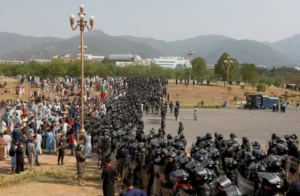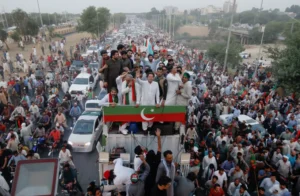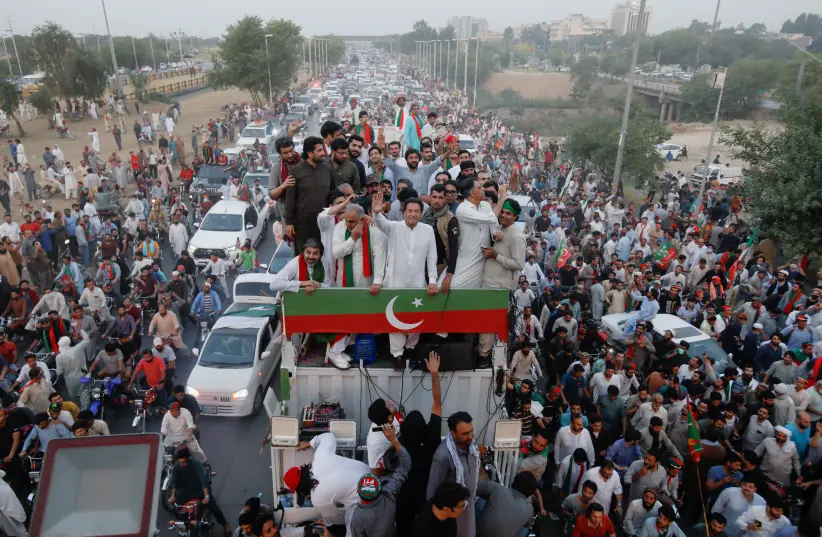As supporters battle police, Imran Khan calls off mass protest but threatens to return with millions of followers.

[Islamabad] Former prime minister Imran Khan delivered an ultimatum to the government of Pakistan on Thursday: Set a date for early elections within six days, or he will return to the capital with millions of supporters.
Khan was deposed through a no-confidence motion in parliament on April 10 that he blames on foreign interference.
While addressing his “long march” protest supporters on Jinnah Avenue, Islamabad’s chief arterial road which leads to the main government buildings, on Thursday morning, he said, “In the past, our nation always feared that we could not survive unless the United States helped, and if the US does not help, we will go bankrupt, but now the nation is ready to make all kinds of sacrifices for its freedom from slavery.
“I applaud the new consciousness, perseverance, and enthusiasm of the nation,” Khan said.
“The present government is trying its best to spread hatred among the people against the police and state institutions, but we never want this, all the institutions are ours, the police is ours and the army is ours,” he said.

“Therefore, we will not conduct a sit-in this time, but rather give the imported government a six-day ultimatum to announce a date for elections with the dissolution of assemblies in June. Otherwise, we will return to Islamabad with millions of people,” Khan declared.
Addressing his remarks toward the justices of the Supreme Court, he asked, “Is this democracy? Peaceful protesters were not allowed, and demonstrators had to face tear-gas shelling, police raids, and arrests.”
“Is this democracy? Peaceful protesters were not allowed, and demonstrators had to face tear-gas shelling, police raids, and arrests.”
Imran Khan
Khan once again stressed that “the US administration had played a key role in removing him and the current coalition government has been forcibly imposed on the people of Pakistan.
“This long march is being carried out to liberate Pakistan from imported rulers,” he said.
The long march
Earlier, as Khan and hundreds of thousands of followers entered Islamabad, the federal government authorized the deployment of army troops to protect the city’s Red Zone, where government, court and legislative buildings, and foreign embassies are located.
Leading a massive “long march,” Khan reached Islamabad a little after midnight on Wednesday night.
According to a Defense Ministry notification, “The army has been called out in view of the law-and-order situation in the Red Zone.”
The developments came after Khan, chairman of the Pakistan Tehreek-e-Insaf (PTI) party, on Sunday announced the Azadi (“Freedom”) March, to be followed by a mass sit-in of indeterminate length. He asked party workers along with members of civil society to reach Islamabad on May 25.
The coalition government on Tuesday decided to stop the Khan-led march to Islamabad, to ensure security and public safety. Police and other law enforcement agencies embarked on a massive crackdown in major cities across the country.
Scores of PTI officials have been arrested as police raided the homes of several party leaders. A constable was shot dead during an arrest operation in Lahore.
All the highways and link roads leading to Islamabad have been blocked by shipping containers. The exit and entry points to all major cities were also closed off to control the movements of Khan’s supporters.
Transportation service between Punjab Province and Islamabad has been suspended since Tuesday.
Mobile phone services were partially suspended across the country; they were restored early on Thursday morning.
Intense clashes broke out between police and participants in the long march.
Despite baton charges, firing in the air, and tear-gas shelling, PTI supporters broke through barriers and headed for the federal capital. Streets in major cities turned into battlefields, including in Karachi, Lahore, and Rawalpindi.
Angry marchers pelted stones and threw tear gas shells back at the police.
Many Rangers paramilitary federal law enforcement officers and police, as well as other paramilitary forces, were deployed at the entry points to the capital.
PTI workers and police came face to face in the D-Chowk neighborhood of Islamabad, turning it into a battleground. Islamabad police special squad officers fired tear gas throughout the night at the protesters, in the largest use of the chemical in the city’s history.
In Punjab Province, PTI sources claimed that more than 12,000 party members were arrested in raids to thwart the march.
Earlier, the Islamabad High Court Bar president filed a petition in the Supreme Court for the release of protesters and the removal of blockades from highways across the country. At the hearing on Wednesday, the petitioner asked the court to intervene to remove blockades placed in the capital.
After hearing arguments, the court ordered the chief commissioner of Islamabad to provide a substitute site for the Pakistan Tehreek-e-Insaf supporters to hold their protest.
“Let them protest and then go home,” Justice Ijazul Ahsan added.
Imran Khan, conspiracy leader?
Marriyum Aurangzeb, the federal minister of information and broadcasting, told The Media Line, “Imran Khan wants to seize Islamabad by force. Whatever is happening in the country, Khan alone is responsible for it.
“Imran Khan is leading the conspiracy of civil war in Pakistan,” she continued.
“Imran Khan is leading the conspiracy of civil war in Pakistan.”
Marriyum Aurangzeb
“Our government is committed to ensuring the protection of life and the property of the people,” Aurangzeb said. “State institutions are being deliberately pushed into politics.”
The minister also claimed that “the entire nation has rejected Imran Khan’s so-called freedom march and expressed full confidence in the government.”
Asad Umar, a senior member of PTI and a former federal minister, told The Media Line that “the citizens of Pakistan are out of their homes for a peaceful protest for the real freedom of their country. The world will see that Pakistanis have broken the chains of slavery.”
Umar added that “five people lost their lives due to the barbaric acts of the government. Hundreds of our people have been arrested, dozens are injured. Unarmed people are being fired on directly; women are desecrated by entering homes without a warrant, so how can we negotiate with such traitors? Now the decisions of this country will be made by the people themselves.
“Immediate announcement of fresh elections will also be beneficial for the ruling parties as well,” he said.
“Our long march has now transformed into a movement whose decisions will be made on a daily basis,” Umar said.
Trends for the economy
Michael Kugelman, the deputy director of the Asia Program and senior associate for South Asia at the Wilson Center in Washington, told The Media Line that there are “troubling trend lines for Pakistan’s economy. The government appears to have no plan. And images of political violence and property destruction won’t exactly attract foreign investors.”
“In Pakistan, the new government has pursued charges against journalists, raided opposition leaders’ homes, and banned a planned opposition protest. These are dangerous policies at the worst possible time, as the economy teeters on [the edge of] collapse. The government may be digging its own grave,” he said.
“The army being called in to guard key buildings in Islamabad presents the possibility of confrontations between the army and the PTI. Amazing just how much the tables have turned politically in Pakistan, given the previous ‘hybrid regime’ model with the two [the PTI government and the military establishment] in power,” Kugelman said.
Adeeb Ul Zaman Safvi, a seasoned, Karachi-based defense and political analyst, told The Media Line the “present situation has brought the country and nation to the most crucial time in its history. It is a significant moment for state institutions to submit to the call of the masses and let them elect the people to form the government.
“Being a visionary leader, Imran Khan was able to cut across all ethnic, linguistic, cultural and religious divides to get support for his narrative,” Safvi said.
“Imran has decided not to compromise on an accountability process for the thugs of the dynasty rulers and those in cahoots with them,” he continued.
“Imran has decided not to compromise on an accountability process for the thugs of the dynasty rulers and those in cahoots with them.”
Adeeb Ul Zaman Safvi
The “dysfunctional judiciary [which played a role in allowing Khan’s ouster to go ahead] was allowed to function as an independent pillar of the state,” Safvi said. “The judiciary hasn’t enjoyed this kind of professional respect from a sitting government since the late 1950s.”

